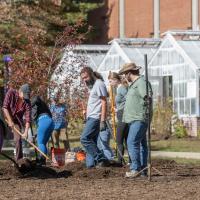
Colleen Mollica Emphasizes the Importance of Mindfulness

Colleen Mollica began in 2019 as the campus minister for the Albert and Amelia first Interfaith Center. However, in addition to being the Student Advisor to the Newman Club and head of the Student Advisory Council, Mollica also runs the Mindfulness Institute for Emerging Adults, a free, four-week class which helps students to cultivate mindfulness in their daily lives.
Originally “Koru”, meaning “loop” or “spiral” and inspired from the indigenous peoples of New Zealand, the Mindfulness Institute for Emerging Adults arose out of research conducted by Duke University psychiatrists Holly Rogers and Margaret Maytan, Mollica said.
“The whole concept of this program grew out of failed attempts to engage with young adults in traditional mindfulness programs. In the late nineties and early 2000’s, Holly began offering traditional 8-week mindfulness courses at Duke for students when she observed how stressed and anxious, they were. She observed that it was easy to get students to sign up. They seemed excited about the concept of it. But the attrition rates were high, so she had a hard time keeping students for the full 8-weeks.”
Meanwhile, Dr. Maytan facilitated an eight-week, body, mind, and skill meditation program for physicians in-training. “She noted that there was also a high drop off rate from her classes due to the overwhelming and demanding schedules of medical students,” Mollica said, “and so they both wanted a better teaching model for young adults that typically have busy schedules and are dealing with certain types of stress.”
In 2014, the Institute was officially founded, and they’ve served over 55,000 students across the world in more than 300 academic locations. At Westfield State, classes range from 15-20 students. Depending on how many students there are, students break out into smaller groups to discuss and practice the skills they learn that week. Students can discover, and explore new techniques via a free, downloadable application on their phone. “There’s a lot of meditation apps out there, but this one follows the pattern of the way the skills are taught each week over that four-week period,” Mollica said. “The book, The Mindful Twenty Something: Life skills to Handle Stress and Everything else by Holly Rogers MD, is also distributed to the participants.”
With the new format and materials, attrition rates for the Institute soon dropped, and Mollica has seen a vast improvement in the mental health of the students who take the class. “I still get notes from some of my first students who talk about how much this has impacted their life in a positive way, and how they've been able to be less reactionary,” she said. “They've been more able to calm themselves in stressful situations. In some cases, it's just changed their outlook on life. They tend to approach things with a sense of equanimity, which is a balanced state of mind, so that all these extraneous things could be happening all around us stressful things, and our response is going to be neutral and calm and not reactionary or reactive to whatever's happening. Personally, I see a benefit because I practice myself. I've been practicing meditation for decades.”
Between external, social variables and the landscape of a person’s internal health, this class couldn’t be more necessary, Mollica emphasizes. “We live in a really reactionary world, especially right now. I think everybody’s sympathetic nervous systems are on high alert all the time. We’re very quick to respond or judge in anger or frustration, whether we're judging ourselves or other people. When we begin to be more mindful, we cultivate that sense of equanimity which is a balance and state of mind.”
Students of all ages and conditions take the class, Mollica said, with her oldest student being in her eighties. “A few years ago, one of my students was dealing with a physical disability, a degenerative disability,” she recalled. “Her stress was, a lot of time, related to her physical ailment. I still get notes from her. She'll say, ‘I'm remembering to breathe. This is helping me through such a difficult time’. I love seeing that, and I know that it’s making a difference for those who really practice and follow through.”
Opportunities to practice mindfulness are the Pause for Peace sessions Mollica holds on Tuesday afternoons at the Interfaith Meditation Garden Gazebo. Gatherings consist of students sitting and resting for five minutes of silence. Whether students use it for “traditional” meditation, prayer, or reflection, it’s a chance to cultivate awareness and mindfulness.
For those who don’t or haven’t been able to attend the class, Mollica said that these skills are accessible all on their own. “My number one recommendation form mindfulness is to put down the device. Even if it's just for ten minutes while you're walking across campus, we miss so much in our daily lives because our heads are down looking at a screen. We’re all guilty of it. Keep your phone in your bag or pocket. Just pay attention with your head held high. You'd be amazed at all that you can notice.”


